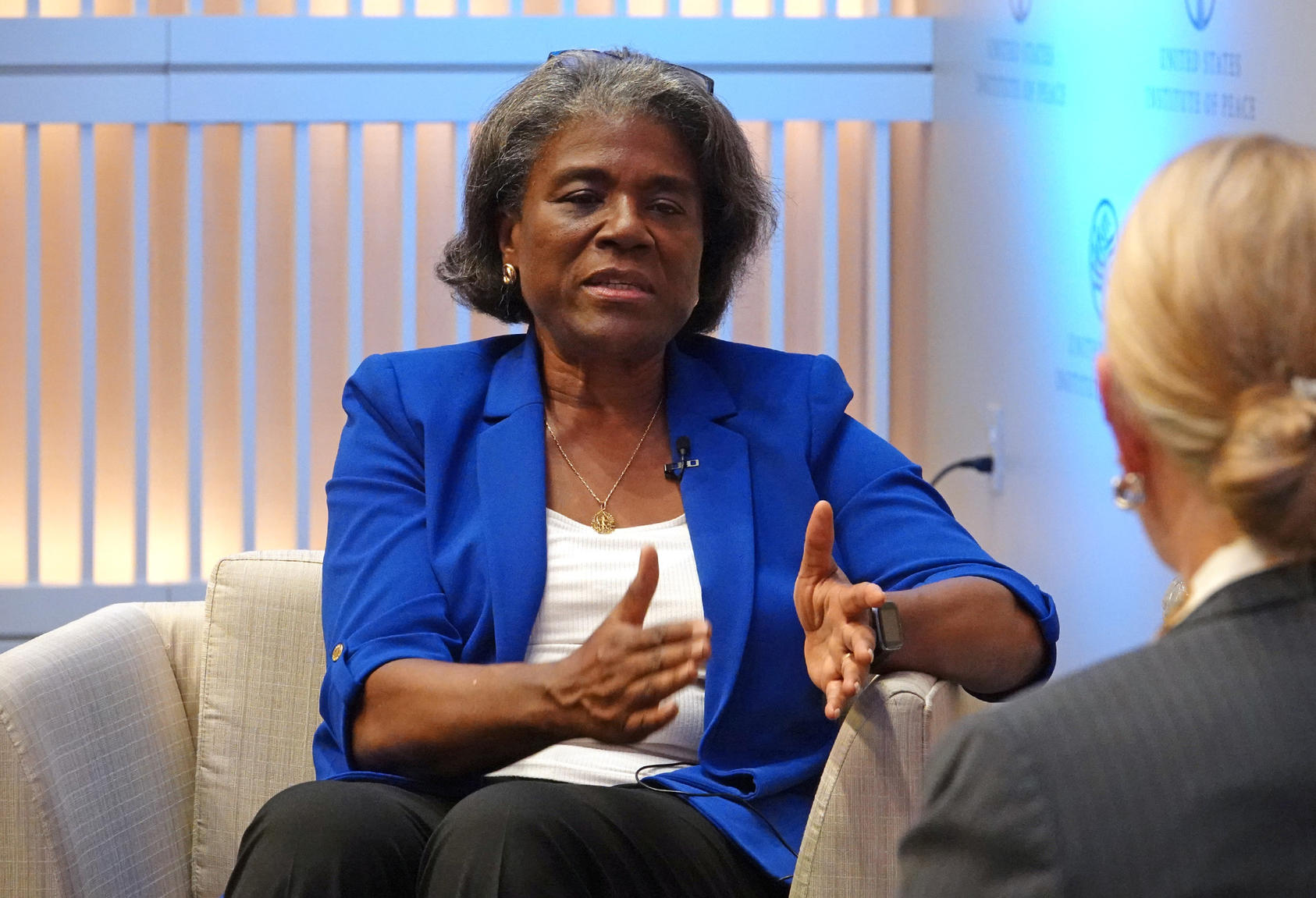At 70, Refugee Convention Faces Many Challenges, Says Ambassador Thomas-Greenfield
The U.S. ambassador to the U.N. cites need to address root causes of migration, encourages countries to do more to support refugees.
Seventy years after its ratification, the Convention of Refugees remains an important pillar of the international system. Every day, conflict, hunger, economic deprivation and climate change are forcing people around the world to flee their homes in search of a better life. It is critical, therefore, that the international community uphold their obligations under the convention, while elevating efforts to address the root causes of migration, according to U.S. Ambassador to the United Nations Linda Thomas-Greenfield.

“If we don’t deal with root causes, we will continue to have people making the tough decision, and I say the word tough very deliberately because it is a tough decision for people to make to leave their homes and leave what they’re familiar with to cross into another country where they are totally dependent on others for assistance,” Thomas-Greenfield said in a discussion with U.S. Institute of Peace President and CEO Lise Grande. The discussion marked the 70th anniversary of the 1951 Refugee Convention.
The 1951 Refugee Convention
The 1951 Refugee Convention established the rights of people who are forced to flee their homes. At its core is the principle of non-refoulement: a refugee or asylum seeker should not be returned to a country where they are liable to face serious threats to their life or freedom. The convention also established responsibilities and obligations for countries that host refugees, including the obligation to protect them.
Thomas-Greenfield said it is important to celebrate the 70th anniversary of the convention. “This convention has survived 70 years, and for 70 years it has provided protection and rights for people who are the most vulnerable around the world,” she said.
Grande pointed out that when the convention was adopted in the early 1950s, it was “both ambitious and necessary.”
“It’s hard to overstate the historic significance of the convention,” said Grande. “The convention set clear universal norms, it established binding obligations on states and it required a level of international cooperation that was unprecedented and remains so today.”
A Growing Number of Refugees
Today, the global refugee situation is dire. According to the United Nations Refugee Agency (UNHCR), 82.4 million people were forcibly displaced worldwide at the end of 2020 “as a result of persecution, conflict, violence, human rights violations or events seriously disturbing public order.”
“Many of us believe that in a world where there are now more than 26 million refugees, [the convention] is as relevant as it’s ever been before,” said Grande. “But,” she added, “there are others of us who wonder whether the convention can continue to be effective in the face of global disruption; pandemics; climate change, which alone could displace a billion people in the next 30 years; violent extremism; illicit transport or criminal networks and interstate violence.”
Climate change is exacerbating migration trends, underscoring the need for principled multilateral action. Hours after he was sworn in on January 20, President Biden signed an executive order for the United States to rejoin the Paris Agreement — reversing a decision by his predecessor to leave the agreement.
“Part of that decision [to rejoin the Paris Agreement] is about looking for solutions to dealing with issues of climate change, those issues that might have the effect of pushing people away from their own countries,” Thomas-Greenfield explained.
Grande also cited “worrying signs” that a number of countries are not upholding their obligations toward refugees. Furthermore, she said, efforts to mobilize resources to support refugee operations have fallen short every year for the past 15 years.
The countries that have made commitments to support refugees must honor those commitments, said Thomas-Greenfield. But she also believes that it is just as important to support and encourage countries that have taken in millions of refugees. Turkey hosts the largest number of refugees in the world — nearly 3.7 million — most of whom are from Syria. On a visit to Turkey in June, Thomas-Greenfield expressed appreciation for the government’s decision to host refugees.
Noting that the United States is one of the largest contributors to humanitarian and refugee programs, the ambassador added, “we work on encouraging other countries to recommit and to reestablish and reaffirm their commitments to refugees.”
Thomas-Greenfield also affirmed the United States’ commitment to refugees. “There was a period, I have to admit, over the past four years where people began to question whether the U.S. commitment would continue. But I’m proud to say that we have reasserted ourselves, and we’re rebuilding the infrastructure that provides support for refugee programs. And we continue to be that beacon of hope,” she said.
A Grim Reminder of the Need to Support Refugees
Thomas-Greenfield recounted a moving anecdote from her visit to the Turkish border with Syria in June. The decade-old war in Syria has driven millions from their homes into neighboring countries and beyond.
The ambassador asked her interlocutors how the refugees were coping with the COVID-19 pandemic. “And one of the organizations said they were told by a refugee woman that COVID was just another reason to die. And that struck me, it was like a stab in the heart, that people are not necessarily so worried about COVID because there’s so many other reasons for them to die, that COVID is just another one on top of everything else that they have to deal with,” she said.
Thomas-Greenfield said the anecdote should serve as a reminder to the international community “that we absolutely need to continue to support these populations in need.”



